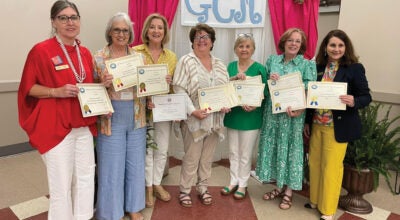Experts share helpful tips with seniors
Published 10:28 am Thursday, July 10, 2014
Lincoln county senior citizens were treated to a morning of educational information at the Jimmy Furlow Center Tuesday.
Three guest speakers visited the center: Demetris Hooker, South Central Community Action Agency case worker for Lincoln County; Doris Ratcliff, community resource development educator with the Alcorn Extension Program; and Rachea’ Martin, business management training officer with the Alcorn Extension Program. Each of the three women gave advice and tips to senior citizens about topics that may affect them: home energy efficiency, estate planning and identity theft.
Energy Efficiency
Hooker is helping to spread awareness about the weatherization assistance program that is administered by the Mississippi Department of Human Services.
The program is set up to help citizens reduce the amount of energy required to cool or heat a home by air sealing, checking all major appliances, attic insulation and various other household tasks. This energy efficiency program targets lower income citizens, especially the elderly, disabled and families with small children.
To apply for the benefit, contact the local Community Action Agency. Income guidelines and items needed for an application are:
• Picture ID for everyone in the home over the age of 18
• Social Security Card for everyone in the home
• Birth Certificate for everyone in the home
• Deed to your home
• Proof of insurance (not required)
• Proof of income for the past thirty days
• Light bill and gas bill.
Estate Planning
Ratcliff spoke to the group about estate planning. She gave several tips about ways to begin the process of organizing and accounting for the process. The six steps she discussed to prepare for estate planning are:
• 1) Initiate the discussion about estate planning. Even though people feel like it may be morbid or too early to discuss, it is important to begin the dialogue.
• 2) Choose a professional adviser, such as a tax attorney or estate attorney, to help with the process.
• 3) Take stock of all assets. This involves gathering all assets and putting them in places where relatives or beneficiaries can easily find them. Ratcliff added that unclaimed, lost or missing property, money and assets that have been given to the state can be searched for through www.missingmoney.com.
• 4) Develop an objective of what will be accomplished.
• 5) consider alternatives. This gives another option to choose if circumstances change, such as illness or divorce.
• 6) Review and modify. Estate planning is and ongoing process and should be modified and changed as needed.
Identity Theft
Martin tackled identity theft. Senior citizens are at higher risk for identity theft according to the federal trade commission. They are targeted for pushing scams and some may have more personal information available through power of attorney, Medicare cards and health care facilities.
Martin discussed a few tips to becoming less susceptible to identity theft, these include:
• Destroy all junk mail. Don’t just throw it away. It has information that criminals can use. Shred all documents with personal
• Use cash instead of cards at stores. There is no way to steal card information if the information is not used to purchase goods.
• If a debit card is used, do not run it as debit. Run the card as credit, so no one can see your pin number.
• Limit the personal information that is carried. Social security cards and other sensitive information should not be carried in a purse or wallet.
• Personal credit reports can be found at annualcreditreport.com.








